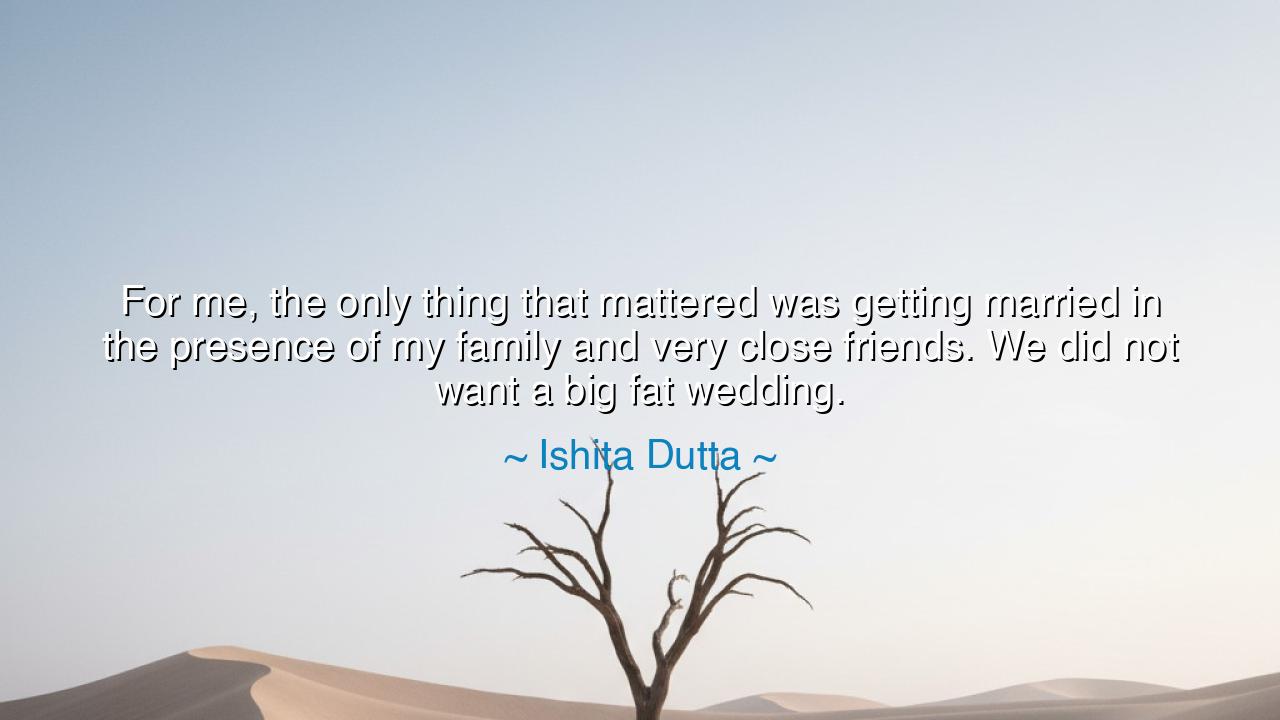
For me, the only thing that mattered was getting married in the
For me, the only thing that mattered was getting married in the presence of my family and very close friends. We did not want a big fat wedding.






Ishita Dutta, with the simplicity of truth upon her lips, declared: “For me, the only thing that mattered was getting married in the presence of my family and very close friends. We did not want a big fat wedding.” In these words lies the eternal wisdom that love’s sanctity is not magnified by grandeur, but by intimacy. The true measure of a wedding is not the abundance of gold, music, or guests, but the presence of those whose hearts are bound to yours.
The ancients too held this belief. In the villages of old, a wedding was often a gathering beneath a tree, with the blessings of elders, the laughter of kin, and the prayers of neighbors. The strength of the union lay not in spectacle but in the authenticity of witness. Dutta’s rejection of the “big fat wedding” echoes this timeless truth: that joy is purer when shared with those who matter most, rather than lost in the noise of crowds.
History offers us the example of Mahatma Gandhi, whose marriage as a boy was marked not by extravagance but by simplicity. Though later in life he criticized the rituals and excesses tied to Indian weddings, he always upheld the belief that the core of a union lay in the bond of two families and the sincerity of love. Ishita’s reflection carries this same spirit — a return to simplicity, to the essence of companionship and shared presence.
Her words also challenge the vanity of modern times, where a wedding often becomes a contest of wealth and spectacle. In resisting this, she claims freedom — choosing not to impress the world, but to honor love. This is an act of quiet heroism, for it reminds us that the sacred should not be lost beneath the weight of show. To prefer a circle of family and friends is to declare that love itself is enough.
Let the generations remember: the greatest treasures of a wedding are not chandeliers or banquets, but the faces of those who bless you with genuine joy. Do not measure your love by the size of the feast, but by the depth of the fellowship. As Ishita Dutta teaches, a marriage made in simplicity, surrounded by true hearts, is richer than a thousand ceremonies — for it is built not on display, but on love eternal.






QHLe Quang Hao
Ishita Dutta’s sentiment about having a wedding with just close family and friends really resonates with me. It’s beautiful how some people choose simplicity over spectacle. In today’s culture, weddings often become big social events, but does that sometimes take away from the essence of the commitment being made? Shouldn’t the focus be more on the relationship and less on the celebration itself?
Bbruh1234
It’s nice to hear that Ishita Dutta chose to prioritize the presence of loved ones over the size of the wedding. It makes me think, what really defines a meaningful wedding? Is it the size and the number of people, or is it the connection shared between those present? Do you think the trend of smaller weddings is growing as people shift focus away from societal expectations?
UPNguyen Mai Uyen Phuong
I completely agree with Ishita’s view on weddings. The idea of having a small, intimate celebration with close family and friends sounds so meaningful compared to the typical over-the-top wedding extravaganzas. Do you think weddings have become more about impressing others with grandeur rather than reflecting the couple’s personal values and relationship? I think smaller weddings might be more personal and genuine.
TNVo Thuy Ngan
Ishita Dutta’s perspective is refreshing, especially in a world where so many people focus on grand, extravagant weddings. It seems like she values the intimacy and emotional significance of the day more than the external show. I wonder, in today’s society, do you think there’s more pressure to have a big wedding than to focus on what truly matters, like family and personal connections?